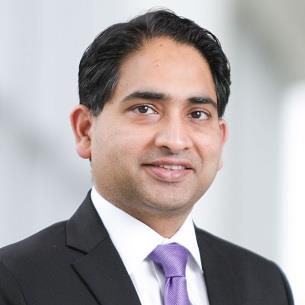Meeting
2016 ASCO Annual Meeting

Cleveland Clinic, Cleveland, OH
Manmeet Singh Ahluwalia , Lisa R. Rogers , Rekha T. Chaudhary , Herbert B. Newton , Ben K. Seon , Manoj A. Jivani , Bonne J. Adams , Ronald L. Shazer , Charles P. Theuer
Background: Endoglin is an endothelial cell membrane receptor highly expressed on tumor vessels that is essential for angiogenesis. It is upregulated by hypoxia and VEGF inhibition and may be an important mechanism of VEGF resistance. The combination of TRC105, an anti-endoglin monoclonal antibody, in combination with bevacizumab (Bev) has demonstrated activity in Bev refractory cancer patients with non-CNS tumors. We hypothesized that TRC105 administered with Bev would improve overall survival in glioblastoma patients who progressed on Bev. Methods: Patients with previously treated, recurrent glioblastoma (GBM) with radiographic progression following Bev therapy, KP status ≥ 70%, and adequate organ function were treated with TRC105 10 mg/kg weekly as a single agent (six patients) and then in combination with Bev 10 mg/kg every two weeks (16 patients). The primary endpoint for treatment with TRC105 and Bev was overall survival (OS), with the null hypothesis being OS of 4.0 months and alternative hypothesis being OS of 7.0 months. Results: Twenty-two patients (median age 54.5; M:F 16:6, median prior therapies 3) were enrolled; one patient did not receive TRC105 and was not included in the efficacy analysis. Initially, six patients were treated with TRC105 as a single agent. TRC105 was well tolerated in patients with GBM; each of six patients progressed by 1.40 months of treatment. Sixteen patients were treated with TRC105 and bevacizumab: adverse events (AEs) characteristic of each drug were not increased in frequency or severity during concurrent dosing. Fifteen patients were evaluable for efficacy of the combination and median overall survival (OS) was 5.75 months (95% CI: 4.21, 9.86), which exceeded the historic OS of 4.0 months seen in this patient population with Bev alone. No responses were seen by RANO criteria and median PFS was 1.81 months (95% CI: 1.25, 2.07) Conclusions: The combination of TRC105 and Bev was well tolerated in Bev refractory GBM patients. OS was 5.75 months, which exceeded the historic OS of 4.0 months. Treatment with the combination of TRC105 and Bev is currently being evaluated in Bev naïve GBM patients in a randomized Phase 2 trial. Clinical trial information: NCT01564914
Disclaimer
This material on this page is ©2024 American Society of Clinical Oncology, all rights reserved. Licensing available upon request. For more information, please contact licensing@asco.org
2016 ASCO Annual Meeting
Poster Session
Central Nervous System Tumors
Central Nervous System Tumors
Central Nervous System Tumors
NCT01564914
J Clin Oncol 34, 2016 (suppl; abstr 2035)
10.1200/JCO.2016.34.15_suppl.2035
2035
224
Abstract Disclosures
2023 ASCO Annual Meeting
First Author: Rongrong Li
2024 ASCO Gastrointestinal Cancers Symposium
First Author: Julien Taieb
2023 ASCO Annual Meeting
First Author: Shuo Li
2022 ASCO Annual Meeting
First Author: Jawad Melhem